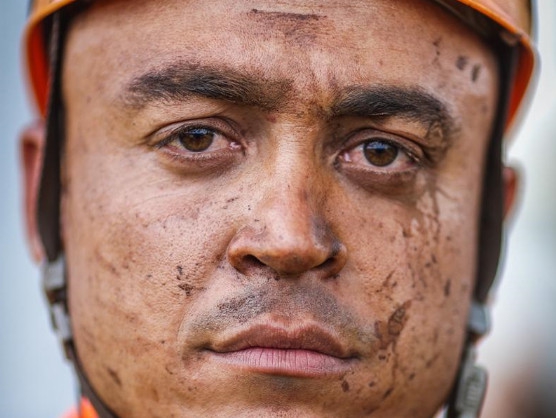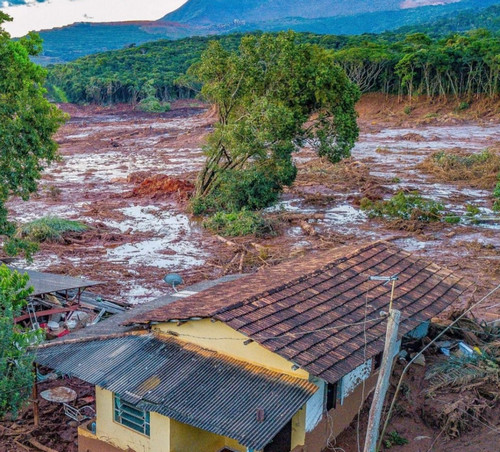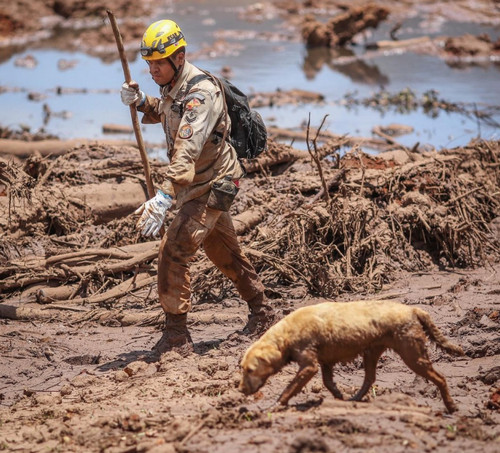
The dam burst in Brazil is yet another tragic example of the mining sector’s negligence in the area of the environment and human rights. Binding international regulations are urgently needed. (Original text in NL – see below)
For the second time in little more than three years, the dam at an iron-ore mine in the Brazilian state of Minas Gerais collapsed. This time, the catastrophe took place in the town of Brumadinho. There were at least 65 victims. Just like in the case of the Mariana disaster, in November 2015, this one happened at a mine (partly) owned by the iron ore giant Vale. Whether the victims in Brumadinho will ever find justice remains to be seen.

© Ricardo Sturk – A torrent of brown mudflow engulfed the region.
The fact that this catastrophe has tarnished the image of Vale is unquestionable. The company’s shares tanked almost immediately. By court order, nearly half of Vale’s assets were frozen for damage claims and fines. Brazil’s president, Jair Bolsonaro, for whom this disaster is particularly inopportune (he wants to give the mining sector a freer rein), visited the area and promised solutions.
Three years after the previous mining disaster, the people affected have still not received proper compensation.
The precedent of Mariana is not very promising. At the time, that mine was a joint venture between Vale and the British-Australian company BHP Billiton. The disaster is a typical example of breaches of human rights in the context of business activities, since victims have inadequate access to justice or legal remedies. Nineteen people died, more than six hundred lost their houses and millions of cubic metres of toxic mine waste flowed into the ocean via the tributaries of the Doce River.
More than three years later, the local people have still not received proper compensation. Cynically enough, the mining consortium is already calling for the mine to be reopened. Nor should we harbour any illusions about the priority given to the case by the Bolsonaro government.
Efforts are not enough
This story does not stop at Mariana and Brumadinho. Environmental disasters and breaches of human rights in the international mining sector are the rule rather than the exception. The Responsible Mining Foundation, an independent organization that promotes responsible entrepreneurship in the sector, launched an index in 2018 that assesses the social and environmental performance of the world’s 30 largest mining companies, based on information about 800 mining sites around the world.
Barely 30 per cent of the mining companies has adopted a proactive human rights policy.
It is thus evident that the efforts made in the area of human rights, health and (environmental) safety are still inadequate. The risk of breaching human rights in the sector remains high. Barely 30 per cent of the companies has adopted a proactive human rights policy. Moreover, it appears that companies do not implement their own policies on the ground sufficiently, if at all.
This points to a crucial problem that increasing numbers of NGOs, academics, lawyers and policymakers are raising: the need for binding regulations governing (multinational) corporations, in order to prevent breaches of human rights and to ensure they do not escape with impunity. Goodwill is not enough to prevent tragedies such as those of Mariana and Brumadinho. Where victims have no leverage to compel respect for their rights, and time after time we see that the efforts made by the sector itself are insufficient, it is clear that globalisation is falling behind in this regard. What is more, companies themselves have stipulated all sorts of hard laws via trade agreements and special arbitration tribunals in order to protect their own interests. In response to this problem, (laborious) negotiations have been under way since 2014 within the United Nations Human Rights Council, with a view to drawing up an international treaty that makes the human rights obligations on companies enforceable.

© Ricardo Sturk – Rescue workers in search of survivors.
Paid for with your money
The international nature of such a binding instrument is crucial in order to pierce the so-called corporate veil. Thus, for example, Vale is hidden behind a tangle of subsidiaries and financiers, so that no one is really responsible. Though it may be a thoroughly Brazilian company, the mining giant enters into collaboration agreements with other large foreign consortia. Then there is the matter of financing, including using your savings and mine: research by FairFin, Broederlijk Delen and 11.11.11 shows that between 2011 and 2016, BNP Paribas, Deutsche Bank, ING and KBC lent billions of euros to Vale and BHP Billiton.
Vale and Bolsonaro have to assume responsibility for the victims of Mariana and Brumadinho. The Brazilian judicial system has to do its job. But in this global crisis of responsibility, the EU and Belgium also play a role. Create binding, international rules governing companies to ensure a level playing field, so that companies will assess and address the human rights risks involved, and thus victims will be able to gain access to justice. Don’t wait until the next dam breaks.
This opinion was first published in Dutch on Thursday, 31 January 2019 in De Standaard.
DUTCH VERSION
Met goodwill hou je de volgende dambreuk niet tegen
De dambreuk in Brazilië is opnieuw een tragisch voorbeeld van de nalatigheid op vlak van milieu en mensenrechten in de mijnbouwsector. Bindende internationale regelgeving dringt zich op.
Voor de tweede keer in iets meer dan drie jaar tijd brak in de Braziliaanse deelstaat Minas Gerais de dam van een ijzermijn. Deze keer vond de ramp plaats in de gemeente Brumadinho. Er vielen al zeker vijfenzestig slachtoffers. Net als bij de ramp van Mariana, in november 2015, gaat het om een mijn die (deels) in handen is van de mijnbouwgigant Vale. Of de slachtoffers van Brumadinho ooit gerechtigheid zullen vinden, is nog maar de vraag.
Dat Vale met deze catastrofe imagoschade lijdt, staat vast. De aandelen van het bedrijf kelderden vrijwel onmiddellijk. Op gerechtelijk bevel werden alvast de helft van de activa van Vale bevroren voor schadeclaims en boetes. Ook president Jair Bolsonaro, voor wie deze ramp erg ongelegen komt (hij wil de mijnbouwsector meer vrij spel geven), bezocht het gebied en beloofde oplossingen.
Drie jaar na de vorige mijnramp heeft de getroffen bevolking nog steeds geen correcte compensatie gekregen.
Maar het precedent van Mariana voorspelt niet veel goeds. Toen ging het om een joint venture van Vale en het Brits-Australische bedrijf BHP Billiton. Die ramp is een typisch voorbeeld van mensenrechtenschendingen in de context van bedrijfsactiviteiten, waarbij slachtoffers onvoldoende toegang hebben tot rechtspraak en remediëring. Er vielen negentien doden, meer dan zeshonderd mensen verloren hun huis en miljoenen kubieke meter giftig mijnafval vloeiden via het stroombekken van de Doce-rivier de oceaan in.
Ruim drie jaar later heeft de getroffen bevolking nog steeds geen correcte compensatie gekregen. Cynisch genoeg pleit het mijnconsortium zelf al voor een heropstart van de mijn. Ook over de prioriteit van het dossier voor de regering-Bolsonaro moeten we ons niet al te veel illusies maken.
Inspanningen volstaan niet
Dit verhaal houdt niet op bij Mariana en Brumadinho. Milieurampen en mensenrechtenschendingen in de internationale mijnbouwsector zijn eerder regel dan uitzondering. De Responsible Mining Foundation, een onafhankelijke stichting die verantwoord ondernemerschap in de sector promoot, stelde in 2018 voor het eerst een index op die de sociale en milieuprestaties van ’s werelds dertig grootste mijnbouwbedrijven in kaart brengt, op basis van informatie over achthonderd mijnsites wereldwijd.
Amper 30 procent van de mijnbouwbedrijven voert een proactief mensenrechtenbeleid.
Die toont dat de inspanningen op het vlak van mensenrechten, gezondheid en (milieu)veiligheid ondermaats blijven. Het risico op schendingen van mensenrechten in de sector is nog altijd hoog. Amper 30 procent van de bedrijven voert een proactief mensenrechtenbeleid. Bovendien blijkt dat bedrijven het eigen beleid op die terreinen onvoldoende tot niet in de praktijk brengen.
Dat wijst op een cruciaal pijnpunt, dat steeds meer ngo’s, academici, juristen en beleidsmakers aankaarten: de nood aan bindende regelgeving voor (multinationale) bedrijven, om schendingen van mensenrechten te voorkomen en straffeloosheid tegen te gaan. Goodwill volstaat niet om tragedies zoals die van Mariana en Brumadinho te vermijden. Wanneer slachtoffers geen hefbomen hebben om hun rechten af te dwingen en keer op keer blijkt dat de inspanningen van de sector niet volstaan, is het duidelijk dat de globalisering op dat vlak achterloopt. En dat terwijl bedrijven zelf wél allerlei harde wetten bedingen via handelsverdragen en speciale arbitragetribunalen om de eigen belangen veilig te stellen. Als antwoord daarop lopen er sinds 2014 – moeizame – onderhandelingen in de schoot van de VN-Mensenrechtenraad om een internationaal verdrag uit te werken dat de verplichtingen van bedrijven op het vlak van mensenrechten afdwingbaar maakt.
Betaald met uw centen
Het internationale karakter van zo’n bindend instrument is cruciaal, om de zogenaamde corporate veil (de sluier van de onderneming) door te prikken. Zo verstopt Vale zich achter een kluwen van dochterondernemingen en financiers, waarbij niemand echt aansprakelijk is. Het mag dan wel een op en top Braziliaans bedrijf zijn, de mijnbouwreus gaat samenwerkingen aan met andere grote buitenlandse consortia. Dan is er nog de financiering, onder meer met uw en mijn spaarcenten: uit onderzoek van FairFin, Broederlijk Delen en 11.11.11 blijkt dat BNP Paribas, Deutsche Bank, ING en KBC tussen 2011 en 2016 samen miljarden euro’s leenden aan Vale en BHP Billiton.
Vale en Bolsonaro moeten hun verantwoordelijkheid nemen voor de slachtoffers van Mariana en Brumadinho. Het Braziliaanse gerecht moet zijn werk doen. Maar in deze globale aansprakelijkheidscrisis hebben ook de EU en België een rol te spelen. Maak werk van bindende, internationale regels voor bedrijven, zodat het speelveld voor iedereen gelijk is, zodat bedrijven mensenrechtenrisico’s in kaart brengen en aanpakken, en zodat slachtoffers toegang krijgen tot justitie. Wacht niet tot de volgende dambreuk.
Deze opinie verscheen op donderdag 31 januari 2019 in De Standaard.
Contact: Wies Willems, Natural Resources Policy Officer, Broederlijk Delen (wies.willems(at)broederlijkdelen.be).
Broederlijk Delen is a Belgian member of CIDSE.
